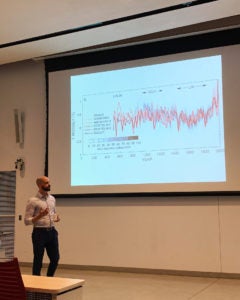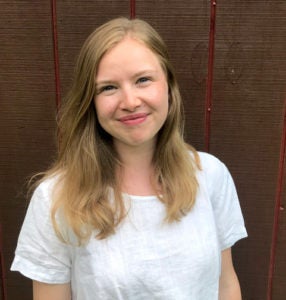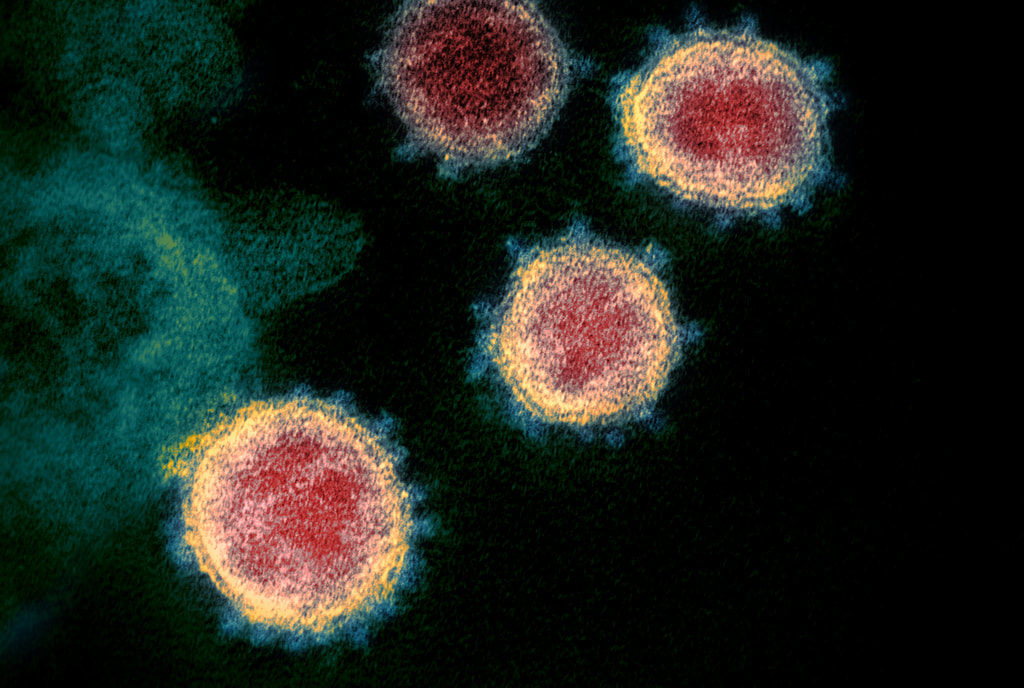Professor Dagomar Degroot and Ph.D. Student Emma Moesswilde Podcast Their Way Through Climate History
Environmental historian Dagomar Degroot and Ph.D. student Emma Moesswilde have revamped Climate History, a podcast created by the Department of History professor that explores what the past can tell us about the present and future of climate change. Their latest episode discusses COVID-19 and its implications for our past, present and future.
“Welcome to Climate History”
Degroot started the Climate History podcast as an extension of his popular website HistoricalClimatology.com, and the Climate History Network, an organization of some 200 scholars that he co-founded with environmental historian Sam White. Both provide resources on the history of climate change: not only recent, human-caused global warming but also the less severe, natural changes that preceded it.

Professor Degroot from climate history talk
Degroot, who stresses the human consequences of those changes on the site, noticed that this work was gaining a large following. As viewership increased at HistoricalClimatology.com, he wanted to create a new way to connect with audiences.
“Podcasts are one of the most common ways that people consume information today, and I think they’re becoming more important in some ways than writing” Degroot says. “Academic papers may only have a few hundred views if that. But our podcast has over 31,000 plays on SoundCloud alone.”
Eager to further develop this resource for people interested in climate change past and present, Degroot created his podcast in 2015. His first episode featured Geoffrey Parker, author of Global Crisis: War, Climate Change and Catastrophe in the Seventeenth Century. Trump’s election, medieval climate change and Frankenstein’s monster were some of the issues discussed with guest speakers in later episodes.
Though the podcast was gaining traction on the website, Degroot said that the project fell by the wayside until Emma Moesswilde began her Ph.D. program at Georgetown.
Creating a Better Podcast

Moesswilde, who is studying the intersection of agricultural and climate history, began her Ph.D. program under Degroot’s mentorship in Fall of 2019. That same semester, the two re-launched the ad-free Climate History podcast as co-hosts through the help of the Georgetown Environment Initiative (GEI), a university-wide initiative to advance the multidisciplinary study of the environment and sustainability.
“GEI has been offering Impact Awards to seed or stimulate research, education and outreach around environmental issues and activities,” says director Peter Marra. “This podcast is a perfect example of the sort of activity we have been able to support.”
Since relaunching in September 2019, seven new episodes with guest speakers have helped create both an entertaining podcast and a collaborative space for academic work.
“In a variety of capacities, we have had speakers come to Georgetown from other universities to speak as guests and in this way, the podcast becomes a broader piece of intellectual exchange,” says Moesswilde.
Degroot is also conscious of reaching out to speakers with whom he feels undergraduate students will be able to engage. Recently, the professor invited two guest lecturers from his HyperHistory course, Valeria Trouet and Amy Hessl to be featured on the podcast.
“Undergraduate students are influential in terms of inspiring topics and guests,” says Degroot. “I have assigned episodes for students to listen to in my class and my class has helped me think of whom to invite.”
The Importance of Being Diverse
To Degroot and Moesswilde, diversity is one of the most important aspects of inviting guest speakers, and of the podcast as a whole.
“Historically the most visible figures in climate change activism and scholarship have been white men, but that is changing rapidly, so we are really trying to have more diverse guests,” says Degroot. “But diversity goes beyond individual identity. The study of climate history has always been about combining different disciplines. You need science to figure out how climate changed, and you need history or archaeology to uncover how those changes affected people.”
Degroot and Moesswilde’s podcast, like their work, is therefore multidisciplinary, combining approaches in for example climate modeling, paleoclimatology, archaeology, and environmental history to uncover how societies responded to climate change. Since they believe the past can help us better understand our present and anticipate our future, they hope to use their podcast to introduce history to as many people as possible.
“Scholarship is a tool that should be for the public good, which is something that I think we really stress at Georgetown,” Degroot says. “When we research, we do it for the world. That was why I started this podcast and our other online resources: so that we can connect with individuals by clearly explaining the work researchers are doing and why it is important.”
Moesswilde said that the idea of shared learning is why she was excited to come to Georgetown and that she is excited to be a part of a project that works collaboratively for the public good.
“It is unique to have a podcast that is rigorous enough to have academics get something out of it, but also appeal to a number of different audiences like students and the general public,” says Moesswilde.
COVID-19 Episode
The podcast’s latest episode discusses COVID-19 and its implications for how we perceive not only our present and future, but our past. Instead of interviewing a guest speaker, Degroot and Moesswilde have a frank conversation about living through two significant crises: the COVID-19 pandemic and human-caused climate change.
“We’ve read a lot of articles that attempt to interpret the present moment in light of the past, by comparing it to very different pandemics for example,” says Degroot. “Yet those comparisons usually seem a little forced to me. Emma and I wanted to have a broader discussion of how this moment is altering how we think and feel as environmental historians – and especially as historians of climate change.”
More about the Podcast
Degroot and Moesswilde, along with a team of graduate students, run the podcast and the Historical Climatology website in their spare time.
“There has been a shift in the role of the graduate students from just being a student to being a junior colleague,” says Degroot. “None of this would be possible without them.”
